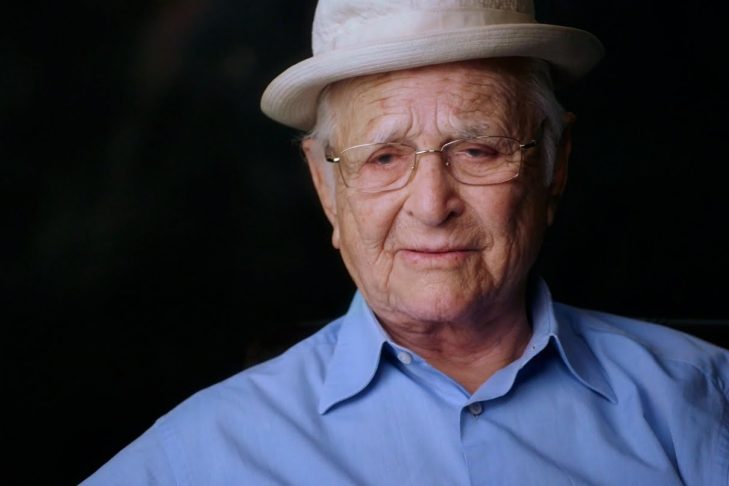At the height of his success, television-producing icon Norman Lear had six shows in the Nielsen Top 10. Lear, who turns 94 on July 27, is the subject of a new documentary film, “Just Another Version of You.” The film is an affectionate tribute to a man whose work placed out-and-out racism and just-below-the-surface bigotry squarely in the public’s consciousness. But its biggest takeaways are that Lear is white, Jewish and fervently liberal. Case in point—the documentary’s title comes from a bumper sticker on his car that announces his bedrock belief in a universal humanity. Lear made shows that not only cemented his reputation as an artist and impresario, but also championed story lines and values that made him a hero of the left.
Filmed as Lear was recording the audiobook of his memoir, “Even This I Get to Experience,” the film ventures into several chapters of his life, including his unhappy childhood in New Haven, Conn. When Lear was 9, his father was arrested and sent to jail for selling fake war bonds. Lear bounced among various relatives until he ended up living with his grandparents. As a teenager he worked three jobs at Coney Island. In World War II he was a bombardier, and from there he went to Los Angeles where he wrote his first parodies with a cousin. He became a comedy writer in the 1950s and 60s, and produced material for Dean Martin and Jerry Lewis.
In one of the more revealing moments in the 90-minute documentary, Lear shares that his most famous character, Archie Bunker, the bigoted patriarch of “All in the Family,” was modeled on Lear’s own sexist, racist father, who, like Archie, often told his wife to “stifle” herself. Critics frequently decried Archie as a “loveable bigot,” a term to which Carroll O’Connor, the actor who portrayed Bunker, objected. “He’s an unhappy man,” O’Connor told Dick Cavett, “poisoned by his prejudices.”
With “All in the Family,” Lear transformed the formulaic, often insipid sitcoms of mid-century America, placing it at the center of politics at their most controversial and contentious. When CBS first aired “All in the Family,” it ran a disclaimer before the opening credits. But soon millions of Americans were tuning in to watch Archie and his liberal son-in-law argue about everything from the Vietnam War to women’s rights.
“Maude,” a spinoff of “All in the Family” which starred Bea Arthur as a staunch feminist living in a Westchester suburb, was a similarly groundbreaking show. An episode of “Maude” that dealt with abortion pulled in 63 million viewers.
It’s no surprise that Lear spent a lot of his time fighting the CBS censors. Archie Bunker’s blue-collar bigotry was introduced to audiences just at the tail end of the Civil Rights movement. And although Lear was also the man who gave leading roles to black actors, not everyone saw him as a civil rights pioneer. For example, Esther Rolle, the African-American star of “Good Times,” which depicted a black family in a Chicago housing project, criticized the show’s bumbling character JJ, whose famous catchphrase was “Dy-no-mite.” It was “a way of putting us all down,” said the late Rolle in a tense, archived interview.
Rolle also insisted that the show depict an intact family with a happily married mother and father. Lear said the controversy on the “Good Times” set led to the creation of “The Jeffersons”—one of the first television series to depict an affluent black family, as well as an interracial couple. The series was a precursor to shows like “The Cosby Show” and “The Fresh Prince of Bel-Air.”
“Just Another Version of You” sparkles with clips from Lear’s television shows. It also includes commentary from fans like George Clooney and Phil Rosenthal, the executive producer of “Everybody Loves Raymond.” Jon Stewart tells Lear, “You raised me,” before his appearance on “The Daily Show.” Amy Poehler introduces Lear at the PEN Center USA’s Lifetime Achievement Award ceremony in 2014 and declares: “You know how hard it is to make people laugh, to tackle big issues and get big ratings? It’s so hard that people don’t do it anymore.”
There’s a lot of information packed into the film’s 90 minutes, which includes Lear’s transition from television producer to full-time activist. Lear stepped away from his trailblazing shows in 1978 and went on to found the liberal advocacy group “People for the American Way,” his response to the Moral Majority and the growing religious right. At the same time, Lear’s fame had taken a toll on his 30-year marriage, which ended in 1986. A year later he remarried and started another family at the age of 66.
“Just Another Version of You” holds up a mirror to the history of contemporary television. Only a decade after “All in the Family” went off the air, a sitcom about nothing became one of the most popular comedies in American television history. But as Phil Rosenthal claims, in the end the history of television will be forever divided into two distinct periods: “Before Norman and after Norman.”
This post has been contributed by a third party. The opinions, facts and any media content are presented solely by the author, and JewishBoston assumes no responsibility for them. Want to add your voice to the conversation? Publish your own post here. MORE



